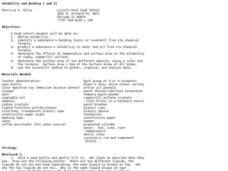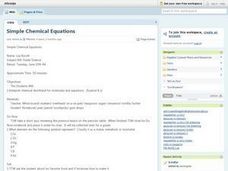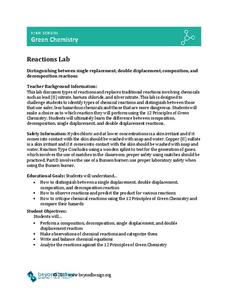Curated OER
IB Chemistry Practice Test
In this chemistry review worksheet, students practice using Avogadro's number, calculating number of moles, and using the gas laws. This worksheet has 39 multiple choice questions.
Virginia Department of Education
The Rate of a Chemical Reaction
If your pupils think a catalyst is a list of their cats, then this might be the lesson for you! Young chemists study the effect of temperature, catalysts, concentration, and particle size on reaction rates during four different...
LABScI
Atomic Structure and the Periodic Table of Elements: The Secret Agent Lab
Food always gets attention! Model atomic structure using fruit loops to represent the subatomic particles. After building models, scholars create ionic bonds using their models. Finally, they use these concepts to create a periodic table.
Curated OER
Chemical Bonding
Eighth graders identify the three main types of chemical bonds. In this chemistry instructional activity, 8th graders draw Lewis dot diagrams of elements and determine the bond formed. They create a model water molecule.
Curated OER
The Effects of Temperature on Chemical Mixtures
Students explore chemical cahnges and the effect of temperature on chemical mixturees, They make observations of the behavior and appearance of certain chemical mixtures and reactions.
Curated OER
Yeast Fermentation
Students measure the temperature change involved in the production of carbon dioxide by yeast. They also identify products and reactants in a chemical and balance the equation.
Aquarium of the Pacific
Lego Molecules
Young scientists construct an understanding of molecular compounds in this hands-on science lesson plan. Using LEGO® to model the atoms of different elements, students build molecules based on the chemical formulas of common compounds.
Cornell University
Unknown Powders
Create a little scientific magic within your classroom! Learners mix powders and liquids and identify chemical reactions. Based on the reactions, individuals determine the identity of various powders.
Curated OER
Simple Chemical Equations
Eighth graders interpret the chemical symbols and shorthand used for molecules and equations. Through guided practice, 8th graders work to decipher and interpret the symbols for chemical equations. An opportunity for independent...
Curated OER
Let Us Bond Together
Fourth graders paricipate in a demonstration about bond strengths and bond types.
Curated OER
Recognizing and Describing Chemical Changes
Seventh graders distinguish between physical and chemical changes in both natural and technological settings. They identify the reactants and products for a given chemical reaction. they then write simple chemical equations given the...
Curated OER
Substances And Chemical Reactions
Students watch and predict chemical reactions when different substances are mixed together. They differentiate between solid, liquid, and gas.
Beyond Benign
Reactions Lab
You're bound to get a reaction from your classes with this experiment! Scholars perform several chemical reactions, make observations, and classify the reactions as single replacement, double replacement, composition, or decomposition...
Global Change
The Carbon Cycle and its Role in Climate Change
So how does the carbon cycle work? Kids participate in a hands-on activity that allows them to understand the chemistry behind climate change and global warming. They act out the process of photosynthesis by labeling themselves as...
American Chemical Society
Energy Levels, Electrons, and Ionic Boding
Learners see how electrons are transferred in the bonding of NaCl. They then create models of NaCl using styrofoam balls and toothpicks to assist them in explaining the formation of ions and ionic bonding.
Virginia Department of Education
Matter and Energy: Equations and Formulas
Using simple materials, an informative lesson demonstrates the Law of Conservation of Matter and explains how to balance chemical equations. Young chemists perform experiments, analyze reactions, and balance chemical equations on their...
Curated OER
Chemical Reactions
In this reactions worksheet, students state the differences between a coefficient and subscript and an exothermic and endothermic reaction. Students review the different types of reactions. This worksheet has 13 short answer questions.
Curated OER
Candy Reaction
In this triboluminescence worksheet, young scholars use wint-o-green Lifesavers to observe a chemical reaction that gives off light. They break a lifesaver up with a hammer and make observations and they chew a lifesaver and make...
Curated OER
Boot Reer Root Beer
Fifth graders investigate chemical reactions. In this physical science lesson, 5th graders make dry ice root beer and identify the type of change that occurs to the root beer mixture.
Virginia Department of Education
Predicting Products and Writing Equations
A chemistry lesson plan presents 14 chemical reactions for scholars to observe, write the equation, and balance the equations. Additionally, it provides ways to extend the activity as it relates to catalysts.
Curated OER
Activity #4 What Do Equations Mean?
Students practice with writing and balancing simple chemcial equations. they comprehend that chemical equations are a method of using a set of univeral symbols to represent what happens experimentally in chemical reactions. Pupils...
Curated OER
Speeding up the Fizz
Students investigate temperature and chemical reactions. They explore the effect of temperature and particle size has on the rate of a simple chemical reaction. In addition, they graph their results and answer assessment questions.
Teach Engineering
Density and Miscibility
The liquids did not mix — so what do density columns have to do with it? The seventh part in a series of nine provides the theoretical explanation of why density columns do not mix. The lesson covers the topics related to mixing and...
Other popular searches
- Chemical Bonding Lesson Plan
- Chemical Bonding Crossword
- Chemical Bonding Activity
- Edible Lab Chemical Bonding
- Chemistry Chemical Bonding
- Chemical Bonding Ionic
- Chemical Bonding Inquiry
- Worksheets Chemical Bonding
- Chemical Bonding Case Study
- Chemistry Chemical Bonding
- Matter and Chemical Bonding
- Science Chemical Bonding

























